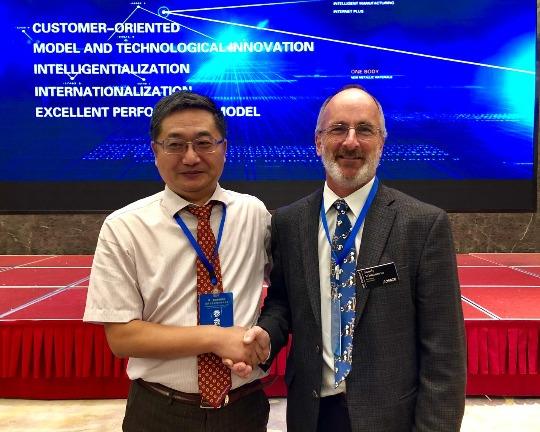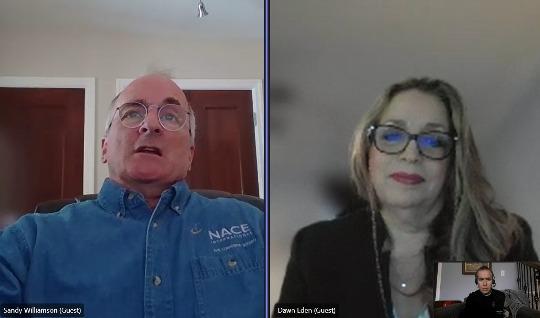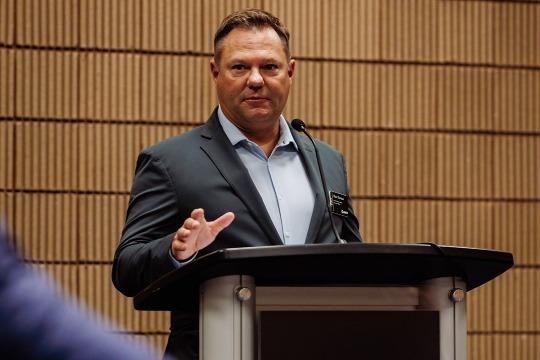As part of a panel discussion, member leaders Dawn Eden and Sandy Williamson joined Ben DuBose, News Editor with AMPP Publications, to explore recent efforts related to materials sustainability within the Association for Materials Protection and Performance (AMPP).
Topics discussed on the podcast interview include what’s new within AMPP’s Sustainability Task Force; key takeaways and insights from the recently completed 2024 AMPP Annual Conference + Expo; and what they see on the horizon as the association ramps up its global outreach around this fast-paced growth topic.
Read on for a partial Q&A transcript, and listen to the full episode online at www.materialsperformance.com/podcasts or at the embedded link below.
Q: Can you share some details of your career background?
Dawn Eden: My interest in corrosion arose from a special research project in my chemistry class during my sophomore year of high school. Back in those days, research was done by visiting the reference section of the local town library to read from books and journals.
What I learned from reading about corrosion was that it is something that costs a lot of money, is very disruptive to industry, and is unlikely to ever be entirely eradicated. But, wouldn’t it be so tremendous to try?
I later received a Bachelor’s degree in chemistry, and then a Master’s degree in corrosion science and engineering. The past 32 years of my career have been largely on the commercial side and focused on corrosion measurement and management through monitoring, cathodic protection, and coatings.
Sandy Williamson: My background includes being a professional engineer and technical specialist with 44 years of experience in corrosion, materials, and inspection technologies related to oil and gas production, refining, oil sands, geothermal, and lithium extraction industries.
My main mission is to promote awareness of corrosion technologies, material sustainability, and material stewardship in order to reduce the global cost of corrosion. In addition, I like to mentor junior corrosion professionals in materials and corrosion engineering for the oil and gas and geothermal industries.
I have provided corrosion control documents and inspection support for the oil and gas industry, including offshore, onshore, upstream, midstream, and downstream sectors. I have also provided material selection expertise for downhole, pipeline and surface facilities. More recently, I have spent more time in the geothermal energy and lithium extraction areas by providing material selection advice.
Throughout my involvement with NACE International (now AMPP), I have chaired several regional and international conferences, symposia, and standards committees related to oil-sands corrosion, CO2 carbon capture, geothermal energy, and material sustainability. I have authored several technical papers, was president of NACE International in 2016-17, and continue to teach the NACE Refinery Corrosion Course.

Q: Why is sustainability so important to you? What are some of the ways your career journeys have touched on the mission?
Eden: Every project and product that I’ve been connected with has had an element of asset management and reliability, with touchpoints toward sustainability.
With corrosion monitoring, the focus was on detecting whether the form of corrosion was general or localized and, if localized, determining the mechanism and how this related to process changes. The ultimate goal was to predict the occurrence of the most damaging mechanisms such that processes could be controlled on a corrosion-based integrity operating window.
Cathodic protection and coatings often work hand in hand to enable the longest, safest operating life of equipment and structures. The improvements in technology allow today’s new-build plant, both offshore and onshore, to enjoy a design life of 50 years and beyond while not breaking the CapEx [capital expenditures] bank or committing massive OpEx [operating expenditures] budgets for maintenance.
Particularly in the case of remote and dangerous operating conditions such as offshore, there is tremendous benefit to the operator to be able to manage unmanned facilities remotely, and with minimal maintenance.
Sustainability improvements are realized everywhere in minimizing materials losses, rework, and maintenance; reducing personnel risk; optimizing production while preventing unforeseen emissions; and extending asset life.
Williamson: As Dawn said, every project and product that I’ve been connected with has also been related to material sustainability. As many members of our association realize, AMPP (formerly NACE and SSPC: The Society for Protective Coatings) has always been in the business of protecting infrastructure, no matter which industry we are involved with.
On a personal note, I started talking about material sustainability with the NACE Board of Directors when I was acting as president in 2016. I took the opportunity at that time to use the IMPACT study to further promote corrosion management and how closely it is related to material sustainability.
When the IMPACT study was released in 2016, it demonstrated very clearly that there are enormous costs associated with corrosion, and therefore underlined the importance of having a sound corrosion management program to protect assets or infrastructure. Furthermore, it outlined how a sound corrosion management program makes economic sense, so economic evaluation tools were included in this study.
More recently, our Materials Performance (MP) Magazine featured an article on Gerry Frankel and Mariano Iannuzzi that quantified the carbon footprint of steel corrosion. In other words, it showed the large effects steel corrosion has historically had on the environment.
In both issues, economics and environment, corrosion management has a large impact. In both, we need to show how our association and its members have been and continue to be good material stewards.
Q: Within AMPP, why was the Sustainability Task Force put together? What has occurred thus far?
Eden: AMPP’s Board of Directors expressed keen interest in developing a sustainability mission for the association. They asked the Technical Program Committee to form a task force for this purpose.
In assembling the members and finding out about everyone’s connection with sustainability in their current and previous work, as well as in volunteering, it became clear that the group had much to contribute in the gathering of information; liaising with other organizations globally; assisting the development of an AMPP materials sustainability standard that was already underway; and bringing sustainability into the conversation at AMPP’s annual conference through a one-day sustainability symposium and forum.

Q: Speaking of the 2024 AMPP Annual Conference + Expo, I know there were several activities related to the task force and sustainability. What were some of the key takeaways?
Williamson: At AMPP 2024, we had two main activities that involved sustainability. On the morning of Monday, March 4, we featured six technical paper presentations in a symposium entitled, “Implementing Successful Material Sustainability and Material Stewardship Practices.” These papers were well received, with some good questions and answers after each presentation. The papers will be made available as part of the conference proceedings, so I encourage people to take a closer look at each paper.
On Monday afternoon, we held a forum panel discussion featuring six presentations by a diverse group of speakers. This forum was recorded so that those presentations, although not published, can be heard at a later date.
We were delighted to have Alan Thomas, our CEO, start the forum with his thoughts on the importance of material sustainability. Next, we had Hongwei Wang, who is leading the SP21466 committee in preparing an AMPP standard on material sustainability, give an overview of the standard. This standard is expected to be published in the very near future and will be an important building block for AMPP’s material sustainability projects.
We also had representatives from the World Corrosion Organization and ASTM International present their viewpoints. I think it was clear that we can work together in improving awareness and importance of corrosion management and material sustainability. It’s not just to our members, but also to decision makers and policymakers in business and government.
Q: Alan Thomas spoke to the need for finding one focus area for AMPP membership, pertaining to sustainability. Is there a sense yet for what that area might be? What is the messaging?
Eden: This topic will be under discussion within the task force, but some initial thoughts include developing a contextual definition of materials sustainability to provide relevant information and resources to all AMPP members including consultants, design engineers, construction workers, operators, facilities owners, and all of the contributing functions that make industry and infrastructure work.
This is intended to inform and enable without being prescriptive or limited to any one particular industry, methodology, or discipline.
Williamson: As Dawn mentioned, our Sustainability Task Force will decide on the most important focus area to move ahead with. For now, I think that we should promote the general awareness of our membership through reading the SP21466 standard. The standard introduces the key concepts surrounding material sustainability, and we have also included several case histories to highlight the concepts.

Q: What’s next for the task force and for the sustainability push within AMPP and the industry? Is there anything to watch for, as far as specific initiatives or technologies?
Eden: The Technical Program Committee continues to forge ahead with our existing technical committees to enable the discussion and sharing of technical information across all industries and corrosion management areas.
Specific topic areas that highlight sustainability, at present, include the use of AI [artificial intelligence] and robotics; materials needs and experience for hydrogen as an energy source; and carbon capture, utilization, and storage.
We see new Technical Communities of Interest starting up throughout the year, and information on all of these can be found on the www.ampp.org website. Hot on the heels of this year’s success, we certainly plan to hold a further sustainability symposium and forum during the next annual conference in 2025 [in Nashville, Tenn. next April].
Williamson: I would just add that AMPP’s research committee is very involved in supporting material sustainability projects, so we look forward to more publications and forums from that community within AMPP.
Q: How can listeners get more involved?
Eden: Anyone interested in finding out more about either the Sustainability Task Force or AMPP’s technical program is invited to drop a line to us at TechnicalProgram@ampp.org. We will be delighted to hear from you!
Comments from these panelists were made on a recent podcast from the AMPP Interview Series. To hear the complete episode, listen below.